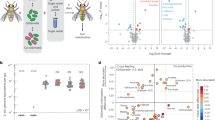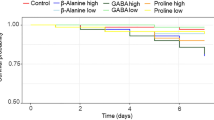Abstract
THE relatively large amounts of royal jelly acid (10-hydroxydec-2-enoic), about 8–9 per cent in lyophilized royal jelly, invites speculation as to its biosynthesis. Recently, Law and Weaver1 reported on experiments using isotopically labelled compounds in an effort to demonstrate formation of hydroxy fatty acids in worker bees. Sodium acetate-1-14C and sodium stearate-1-14C were fed to worker bees and also included in an incubation medium with excised mandibular glands. In both cases considerable radioactivity was detected in lipid extracts of the mandibular glands, but the hydroxy acid fraction did not become labelled.
This is a preview of subscription content, access via your institution
Access options
Subscribe to this journal
Receive 51 print issues and online access
$199.00 per year
only $3.90 per issue
Buy this article
- Purchase on Springer Link
- Instant access to full article PDF
Prices may be subject to local taxes which are calculated during checkout
Similar content being viewed by others
References
Law, J. H., and Weaver, N., Nature, 188, 938 (1960).
Brown, W. H., and Freure, R. J., Canad. J. Chem., 37, 2042 (1959).
Author information
Authors and Affiliations
Rights and permissions
About this article
Cite this article
BROWN, W., FELAUER, E. & SMITH, M. Biosynthesis of Royal Jelly Acid from Sucrose. Nature 195, 75–76 (1962). https://doi.org/10.1038/195075a0
Issue Date:
DOI: https://doi.org/10.1038/195075a0
Comments
By submitting a comment you agree to abide by our Terms and Community Guidelines. If you find something abusive or that does not comply with our terms or guidelines please flag it as inappropriate.



